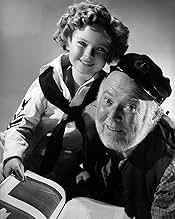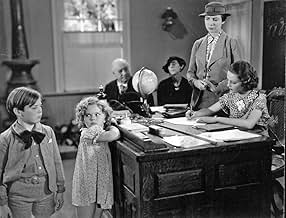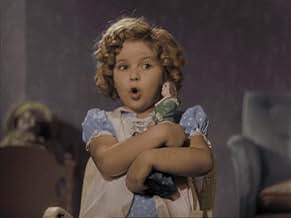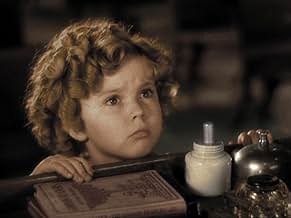A little girl named Star lives with the lighthouse keeper who rescued her when her parents drowned. A truant officer decides she should go to boarding school, but she's rescued by relatives.A little girl named Star lives with the lighthouse keeper who rescued her when her parents drowned. A truant officer decides she should go to boarding school, but she's rescued by relatives.A little girl named Star lives with the lighthouse keeper who rescued her when her parents drowned. A truant officer decides she should go to boarding school, but she's rescued by relatives.
- Awards
- 3 wins total
- Deputy Sheriff
- (as James Farley)
- Ira J. Slocum - Storekeeper
- (uncredited)
- Second Engineer
- (uncredited)
- First Engineer
- (uncredited)
- Foreman
- (uncredited)
- Governess
- (uncredited)
Featured reviews
Here, the "villain" is truant officer (Sara Haden) who wants to take Shirley away from good guy "Captain January" (Guy Kibbe). Kibbe and Slim Summerville are fun to watch as peers and friends who squabble all the time. Haden is effective in her role because you just want to slap that woman!
Shirley and Buddy Ebsen team up for a very entertaining song-and-dance routine to "The Codfish Ball," the best song in the movie.
The film gets a bit uncomfortable when Shirley gets taken away but ends in the normal tearfully-happy Shirley, as always, back with her loved ones and the people who really care about her. Those include the "widow" played by Jane Darwell and the school teacher, acted by June Lang.
All in all, it's the normal Temple movie that provides good feelings, something we viewers always need.
The story is not exactly the same as the original. The biggest difference is WHO Captain January is. In the 1924 film, it was the child's nickname but in this film, it's the name given to the child's adoptive father. Either way, the child was found along the shore following a shipwreck where the child's parents were killed. She was raised by a nice old lighthouse keeper (Guy Kibbee) and years later, a nasty old biddy wants to take the child away and put it in an orphanage because she feels the man is a bad influence on the kid. In the original, it was the child's aunt and uncle who threaten to take the kid and the old biddy was only a minor character. Either way, it all ends well--and everyone, naturally, is very happy.
This is a good family film....but not a great one. Shirley was fine and the film enjoyable but it just didn't seem like an improvement on an already lovely film. Worth seeing, but I recommend you see both.
Based on the story by Laura E. Richards, CAPTAIN January is an updated reworking to an earlier 1924 Principal Pictures 1924 silent version starring Baby Peggy, Hobart Bosworth and Irene Rich. As much as this new adaptation has the makings of a straight drama, due to Temple's musical talents, and the support of a young hoofer named Buddy Ebsen (on loan from MGM), song numbers were inserted to give it some added sparkle. With the score by Lew Pollack, Sidney Mitchell and Jack Yellen, songs include: "Early Bird" (sung by Shirley Temple); "The Codfish Bowl" (sung and danced by Temple with Buddy Ebsen); a portion from "Lucia di Lammermoor" (an opera by Gaetana Donizetti, performed by Temple, Guy Kibbee and Slim Summerville) "The Right Somebody to Love" (sung by Temple/ and unseen chorus during dream sequence); "The Right Somebody to Love" (reprise by Temple) and "The Codfish Bowl" (sung by Temple, Kibbee and Summerville). With the exception of a dream sequence, where singing is possible, all the other song numbers are inserted the story, with the music played by an off-screen orchestra right on cue. For the fade-in, it's morning and Kibbee places a record player into Temple's bedroom. Temple awakens, stretches her arms into the air and looking straight into the camera starts singing the opening lyrics of "Good Morning" which begins her opening number of "Early Bird." She dances her way to the bathroom where she changes into her sailor clothes, and occasionally continues to look her way towards the camera as she brushes her teeth. A little fake, but not as imaginative as her next number, "The Codfish Bowl," displaying the dancing talents of both Temple and Buddy Ebsen. This is performed on the dock surrounded by loafing seamen playing a harmonica and according before the hi-fi off-screen orchestration sets in. A show stopper that's regrettable in not having Ebsen and Temple performing another one for an encore. Also in the cast are Jerry Tucker (Cyril Morgan); Nella Walker (Mary Mason); George Irving (John Mason); Harry Hayden(Ira J. Slocum(; and James Farley(The Deputy Sheriff).
While 20th Century-Fox might have used some of its own resident lovable old coots as Claude Gillingwater Sr., playing Captain January, for example, the studio used Guy Kibbee from Warner Brothers, who, in the final product, proved to be the logical choice. Kibbee also makes a memorable over-sized baby with a bib sitting in the high chair in an amusing dream sequence with Temple acting as his nursemaid.
Aside from some melodramatic scenes, including Temple crying for "Cap" as she is being being taken away by the officers after losing his position as lighthouse keeper, CAPTAIN January is equipped with amusements, the best being the exchanges between Guy Kibbee and the underrated Slim Summerville as Captain Nazro, January's best friend, along with the middle-aged Eliza Croft (Jane Darwell), a rich widow woman after the affections of January. Buddy Ebsen, years before immortalized on television as Jed Clampett in THE BEVERLY HILLBILLIES (1962-1971), supports as the loafer with a talent for dancing who finds companionship with the local school teacher named Mary (June Lang). Their characters are essential to the plot, but both have little to do. The story relatively belongs to the trio of Temple, Kibbee and Summerville.
Temple, who rarely gets a chance to share screen time with another child actor of equal age status, does so this time with Cyril Morgan (Jerry Tucker), a precocious but obnoxious little boy with whom she finds she has to compete in an entrance exam to enter the third grade. It so happens that Cyril happens to be the nephew of the woman who wants to take Star away from January. As much as the boy keeps telling Star that she knows nothing, this equally precocious little girl eventually displays how much she does know and more.
CAPTAIN January, at 76 minutes, was one of the handful of feature films displayed in 1989 on Playhouse Video, a division of CBS/Fox Video, as part of the Shirley Temple collection. With video transfer satisfactory, most important, it's complete, with the restoration of the closing cast credits to the underscoring to "The Codfish Bowl", usually cut from TV prints. In some local television markets (particulary the New York City area prior to 1976), the closing cast credits was substituted with a NTA (National Television Association) logo. When the Disney Cable Channel presented Shirley Temple movies in the early 1990s, all of which were colorized, the closing cast credits were included while prints for American Movie Classics (1996-2001) and later, the Fox Movie Channel, in the original black and white format, eliminated the closing credits with an insertion of a THE END title card taken from another movie. FMC later had the closing credits restored. While the Shirley Temple collection from Playhouse Video has been out of print, CAPTAIN January can also found colorized in both the VHS and DVD format.
Regardless of format CAPTAIN January, is recommended viewing for adults and youngsters alike, especially those who endure themselves with old-fashioned screen entertainment equipped with comedy, songs and a touch sentiment combined. (**1/2)
Did you know
- TriviaThe earliest script of the movie called for Captain January to die at the end, just before Star is taken away from him by her relatives: "On their final evening together, he allows her to light the lamp in the lighthouse [something she has always wanted to do]. She is unaware that the Captain has suffered a massive heart attack and is unable to carry out his duties. January sees the lamp lit and dies." Shirley Temple's producer, Darryl F. Zanuck, made extensive changes to this script.
- Quotes
Helen: My mother was very beautiful, wasn't she, Cap?
Capt. January: Mighty pretty, Star, according to her pictures.
Helen: We're awfully lucky, aren't we?
Capt. January: Lucky?
Helen: I'd never have known what my mother looked like if it wasn't for that trunk. Did you swim out to get it, too?
Capt. January: No, it just washed ashore.
- Alternate versionsJohn Carradine's scenes were deleted and uncredited.
- ConnectionsFeatured in Gotta Dance, Gotta Sing (1982)
- SoundtracksAt the Codfish Ball
(1936)
Music by Lew Pollack
Lyrics by Sidney D. Mitchell
Sung and danced by Shirley Temple (uncredited) and Buddy Ebsen (uncredited)
Also sung by Shirley Temple (uncredited), Guy Kibbee (uncredited), Slim Summerville (uncredited) and an offscreen Chorus
Played also during the end credits
- How long is Captain January?Powered by Alexa
Details
- Release date
- Country of origin
- Language
- Also known as
- Mali pomorac
- Filming locations
- Monterey, California, USA(fisherman's wharf)
- Production company
- See more company credits at IMDbPro
- Runtime1 hour 17 minutes
- Color
- Aspect ratio
- 1.37 : 1
Contribute to this page






































